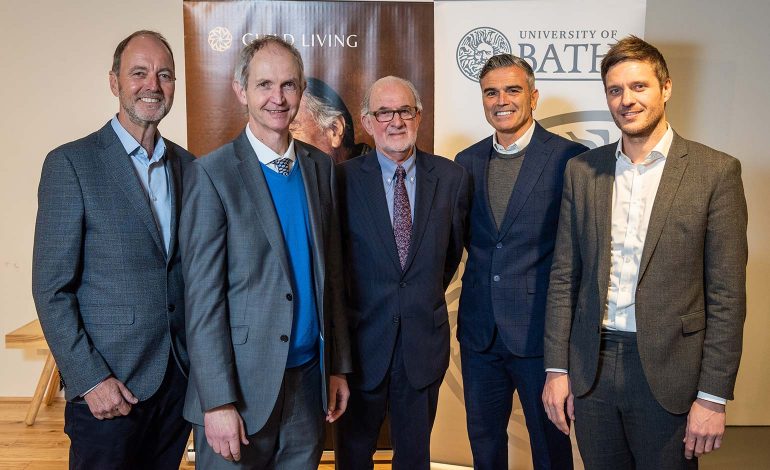The University of Bath and Guild Living have announced a major research partnership, bringing together academics from multiple disciplines, to identify solutions to healthy ageing.

Photo © University of Bath
Guild Living will use the findings to drive its decision making around architectural design, technology, wellbeing and care across its pipeline of later living communities.
The programme is being led by visiting University of Bath Professor Malcolm Johnson, who featured on Channel 4’s BAFTA award-winning series Old People’s Home for 4 Year Olds.
More than 10 million people in the UK today can now expect to see their 100th birthday, compared to the just 15,000 centurions who are currently alive.
However, living longer doesn’t mean living well. Ageing populations are creating new demands for technologies, products and services, including new care and different housing models.
In 2017, the Government made ageing a key part of its industrial strategy, committing £400 million to support research across the country.
Against this backdrop, Guild Living has partnered with the University of Bath to revolutionise the way they age, using robust research to design “age-friendly” environments, communities and care programmes.
The University of Bath is dedicated to strategically tackling all issues related to ageing and ensuring its projects translate into tangible outcomes which can benefit wider society.
The first project currently underway by the partnership explores the causes and impact of emotional loneliness in older people living in Australia and Britain.
Detailed, qualitative data is being sourced from individuals residing in later living communities, drawing from in-depth, systematic interviews about people’s experiences of attachment, close relationships, loneliness and the transition to retirement community living.
The research aims to identify interventions and support which can improve health and independence, whilst significantly reducing social isolation. Results of the study will be used to drive development decisions and adapted into bespoke programmes, rolled out across Guild Living’s communities.
The research will study how three distinct areas impact loneliness, through a number of disciplinary approaches, including:
- Architecture – buildings and environment
- Connectivity – tools that help people relate and communicate
Professor Malcolm Johnson, visiting Professor at University of Bath, explained: “As a youth-oriented society, we need to recognise that people are living longer and, consequentially, “old age” is happening much later.
“The dominant feature of old age care is looking after people’s health and safety, yet all too often, people are being left in their own homes and on their own, with minimal human contact.
“This risks physical, emotional and cognitive decline. Our research will investigate what interventions we can make to reinstate people’s confidence, tackle one of the biggest killers, loneliness, and shift our culture towards valuing – rather than ostracising – people in their older years.”
Eugene Marchese, founder at Guild Living, added: “With an ageing population and a growing social care crisis, Britain has an opportunity to embrace radical change – not just in housing or care – but how we treat older people.
“Guild Living’s academic approach to design, development, operations and care is motivated by a fundamental commitment to drive forward change in how we live in later years, driving by robust research.
“Our partner, Legal & General, shares this vision, and has the capital and long term commitment to revolutionise the way we age.
“University of Bath is one of the premier institutions in ageing research and is the perfect partner for us as we begin our journey to tackle ageism across the spectrum.
Professor Julie Barnett, Associate Dean (Research) in the University’s Faculty of Humanities & Social Sciences who will be directly involved in research for this project said: “Creating environments and opportunities to enable more people to live as they want for longer is a shared ambition for many of our researchers across many disciplines at the University.
“We’re able to produce world-leading research and experts to tackle this challenge, but having good partnerships like Guild Living, with which we can exchange our knowledge and realise our ambition, we can ensure the results of our efforts not only benefit our City’s residents, but our region, nation and society as a whole.”



